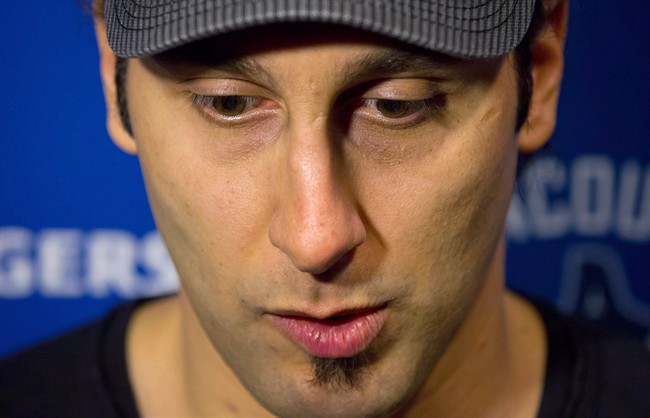NEWARK, N.J. – Roberto Luongo appeared to be the most available player in hockey history. The veteran goaltender wanted to be traded, and the Vancouver Canucks tried desperately to accommodate him.

Luongo knew the time and money left on his 12-year, US$64-million contract made that more difficult, but until this past weekend it still looked like it would happen. When Cory Schneider was shipped off to the New Jersey Devils instead, it brought Vancouver’s goaltending situation into sharp focus: Luongo is the unquestioned No. 1.
But now Luongo has the challenging task of resuming a role he lost and trying to reclaim the status of elite goaltender in the city he asked to be dealt from.
“I think he’s been prepared to move on for about a year now. To have that taken away, you have to sort of reset and readjust,” Schneider said. “It’s not easy to do, but he’s a resilient guy and he’s been through all this before, and I’m just hoping that he makes the best situation he can and that he can keep playing well and be the goalie that we all know he can be.”
The goalie Luongo can be is more evident on his resume than in his reputation. The 34-year-old won a gold medal with Canada at the 2010 Winter Olympics after replacing Martin Brodeur, and he came one victory away from capturing the Stanley Cup for the Canucks in 2011.
But Luongo’s save percentage dropped to .907 during the lockout-shortened season as he and Schneider dealt with the uncertainly and attention of sharing the net. He became far more popular for his Twitter personality than his play.
GM Mike Gillis is counting on Luongo returning to gold-medal form now that the situation was finally resolved.
“I believe Roberto is a professional,” he said. “I think he is an outstanding person, an outstanding goaltender and I anticipate him being one of the front runners for the Sochi Olympics playing goal for Canada. Based on all those features I don’t expect there to be a problem, but I haven’t spoken to him.”
Owner Francesco Aquilini flew to Florida to speak with Luongo on Sunday. According to Schneider, the Canucks organization didn’t have much contact with either goalie as Gillis tried to figure a way out.
But Luongo and Schneider stayed in touch, talking over the weekend as rumours swirled. The 27-year-old wished his old partner nothing but the best as he came to grips with getting a new start in New Jersey.
Luongo doesn’t get to start fresh, but Gillis spoke to agent Gilles Lupien and figures life can now go on as normal.
“I’m not anticipating there being issues, but if there are, we’ll deal with them,” Gillis said. “He signed a long-term contract with our club for a lot of money and (was) very happy to do it.”
Money doesn’t guarantee great goaltending. The Philadelphia Flyers figured that out with Ilya Bryzgalov after buying him out of the final seven seasons of a nine-year, $51-million deal.
But Luongo has a history that suggests he can rebound now that he doesn’t have to split duties with Schneider. Luongo’s best seasons have come when he has played the bulk of games, like when he had a .928 save percentage when playing 60 in 2010-11.
Luongo is a bit older now, but Schneider doesn’t have any doubts about the veteran returning to form.
“He’s been a resilient guy and he’s been through a lot and he’s been counted out and knocked down and he’s always gotten back up,” Schneider said. “Having worked with him for three years now, I just know he’s a great goalie, whether that’s in Vancouver or anywhere else. I think he’s going to play his hardest to be his best.”
Schneider’s agent Mike Liut, meanwhile, said he was not surprised the goaltender was traded.
“In the end it went as expected,” Liut said in an e-mail. “The Canucks’ original plan was to trade Cory at some point because Roberto’s contract extended him into his 40s. That the Canucks altered that strategy to moving Roberto was more surprising than their final decision to switch back to seeking a trade involving Cory. All part of the game.”
Liut said Schneider was disappointed in being traded, but understood that few players spend their entire careers with one team.
“We knew that Roberto’s contract would be difficult to trade because of its term/dollars at best,” said Liut.
The agent indicated the new collective bargaining agreement worked against Schneider staying because the Canucks and another team could both take a sizable salary cap if Luongo is traded and retires before his contract expires.
Luongo’s contract is front-loaded, so he earns much more in the early years, and the annual cap hit is manageable. But under the new CBA, the so-called Luongo rule seeks to offset the early soft hits.
“The punitive cap benefit capture that. The NHL demanded in the new CBA made Roberto’s contract all the more difficult to trade,” said Liut.
— With files from Monte Stewart in Vancouver

Comments